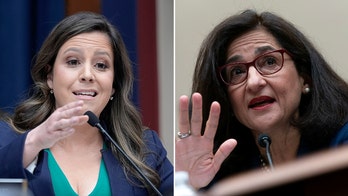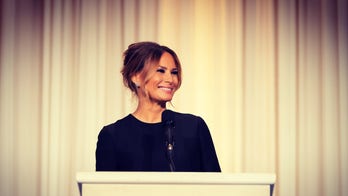President Obama invited CEOs to the White House Wednesday to talk about the economy and how to speed up the economic recovery. But, just as he was meeting with these titans of industry, some industry insiders complained that the invitees did not represent a true business cross-section, a critique indicative of lingering mistrust within the business community.
The list of CEOs includes some heavy hitters: Ken Chenault, the Chairman and CEO of American Express; John Chambers, the Chairman and CEO of Cisco; Indra Nooyi, the Chair and CEO of PepsiCo; and David Cote, the Chairman and CEO of Honeywell -- who told Fox News on his way into the White House that the "re-start" on relationships with business leaders was encouraging and it was good to see Obama handle the situation.
"I would say when you go through a time like we had with the recession, it's easy for relationships to get strained, as it is with anybody when you go through a tough time," Cote told Peter Barnes of Fox Business Network. "And I think relationships did become strained, and things were said on both sides that shouldn't have been, and did not further the opportunity to work together."
"This is our chance to work together," Cote continued. "This is our chance to do that and, as I said, I give the president a lot of credit for being the man big enough here to say, let's restart this, let's work on how to create a more vibrant economy."
Before the meeting started at the Blair House, the president made a short statement underscoring his commitment to job creation.
"I believe that the primary engine of America's economic success is not government," Obama told reporters. "It's the ingenuity of America's entrepreneurs. It's the dynamism of our markets. And for me, the most important question about an economic idea is not whether it's good short-term politics or meets somebody's litmus test. It's whether it will help spur businesses, jobs and growth."
However, for some, the push by the president, while encouraging, is still not enough.
"Regulations soak up a tremendous amount of time, money, resources for corporations," said Johanna Schneider of the Business Roundtable. "We do understand and completely support the aspects where... regulations are attempting to keep Americans safe. But there is a point at which you can over-regulate each and every industry into a lack of productivity, and we are clearly at that juncture. So if the White House is looking at revising and making regulations smarter, which are more cost effective, which are easier to implement, then that would be music to our ears."
Wednesday's meeting comes as Larry Summers prepares to leave his post as Chief Economic Adviser to the White House and the president continues his search for a replacement. While Roger Altman, a Wall Street executive and former Deputy Treasury Secretary at the White House under President Clinton, has been mentioned as a possible replacement for Summers, the news that Jamie Dimon of Citigroup was visiting the White House last week has also fueled rumors he could be next in line.
Either man would represent a shift in the Obama White House towards business -- in a way many feel would do some good.
"If the White House can find a respected business leader for an economics post, then businesses feel that the White House will finally have someone who understands not only the needs but also the frustrations of the business community," says Rea Hederman of the Heritage Foundation. "Business leaders are tired of being ignored by the White House, when they are not outright scape-goated for the sluggish economy."
But Hederman says there's a real concern in the business community that the Obama White House needs to work harder with executives, and prove they know how to work with corporations.
"Businesses executives are concerned that the White House does not understand how businesses function, and executives have been surprised at some of the hostility from the White House," he said. "This administration's preference is to enact broad legislation that has executive branch bureaucrats and regulators determining the details and rules of the game. Businesses are frustrated the president's ability to change the rules midstream makes it almost impossible for businesses to plan for the future. As a result, businesses have been sitting on the sideline choosing to delay expansion and forego immediate investment opportunities."
And it appears the White House is going to be listening very seriously to the executives today. Fox News learned there were at least five main discussions at the Blair House, led by a variety of business leaders focusing on a range of issues: skills and training, the deficit commission findings, innovation and incentives to invest in the United States, to name a few.
The meeting is part of what could be labeled a "charm offensive" by the White House. As the Republican Congress is set to take over in January and priorities on the Hill shift, the administration is also seeking to court former foes -- like the Chamber of Commerce.
It's been reported the president COULD make a speech at the Chamber sometime in the new year, a major shift in policy for a White House that has publicly been at odds with the Chamber and its CEO Tom Donahue.
Late last week, Donahue told Fox News' Neil Cavuto he commends Obama's latest effort to hammer out a deal on the tax cuts with Republicans.
"I think the president is facing one of the first real economic challenges of the new world, after we got out of this serious crisis and with a new Congress," said Donahue. "And he's looking around and he said where do I find my votes, where do I find my support to get something that all of us believe will help him through what's going on in this economy. And I think he's done the right thing to reach out to people in both parties."




